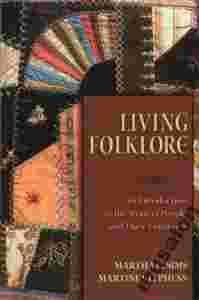|
Martha C. Sims, Martine Stephens
Living Folklore
An Introduction to the Study of People and Their Traditions
Utah State University Press 2005
Stron 310
Tekst: angielski
Książka jest bez śladów używania.
Contents
Acknowledgments ix
Preface xi
i folklore l
Whatis folklore? l
A working definition l
Scholarly definitions of folklore 8
Genres of folklore 12
Defining folklore beyondgenre labels: texts and contexts 19
A briefhistory of folklore study 21
2 groups 30
What is a folk group? 31
Definitions 34
Howfolk groupsform 38
Self-identification and group membership 41
Family, school and occupational groups 44
Family 45
School groups 47
Occupational groups 50
Example: folklore in the music störe 53
Groups and belief 56
Example: belief and contemporary legends 60
3 tradition 64
What is tradition? 64
Tradition is both lore and process 65
Tradition helps to create and confirm a sense of identity 66
Identified äs a tradition by the Community 68
How do people learn and share traditions? 68
Example: tradition in our daily lives 72
Do traditions disappear? 74
Dynamic and conservative elements of tradition 76
Inventing tradition 82
The question of authenticity 84
Example: traditions infolk art 87
4 ritual 94
What is ritual? 95
Low-context and high-context rituals 98
Invented ritual 99
The question of belief in sacred and secular rituals 102
Liminality and ritual space 105
Types of rituals 110
Rites of passage 111
Corning of age rituals 114
Initiation rituals 119
Naming rituals 120
Example: rituals and private and public identity 121
5 performance 127
What isperformance? 128
Example: a proverbial performance 129
The study of performance 133
Performance texts 134
Texture 136
Context 137
Physical context 138
Social context 139
Recognizing texts in context: performance marker s/ framing 141
Reflexivity 144
Emergence 146
Folklore that pushes the boundaries 150
Example: performance that transcends roles and rules 152
Aesthetics 155
Critic v. group consensus 157
Traditionality 157
Skill 159
Practicality 161
The nature of aesthetic response 162
Personal narrative in performance 167
Example: A Personal Narrative Emerges 170
6 approaches to interpreting folklore 174
Functionalism 174
Structuralism 179
Psychoanalytic Interpretation 187
Post-structuralist approaches 192
Feminist interpretations 193
Reciprocal ethnography 195
Intersectionality 198
| 
